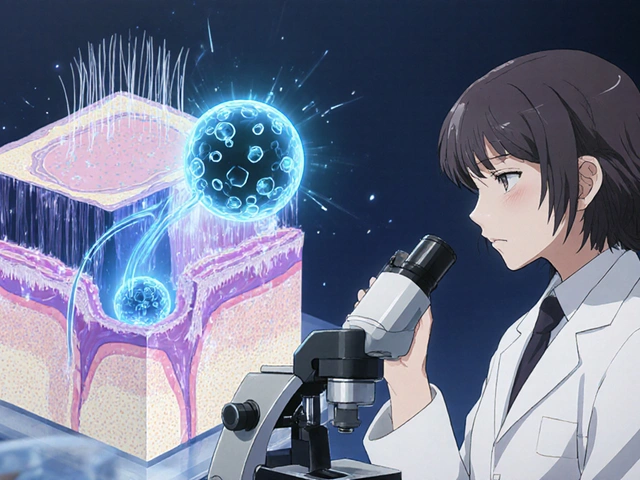Understanding Gastroenteritis and Its Symptoms
Gastroenteritis, commonly known as the stomach flu, is an inflammation of the stomach and intestines caused by a viral or bacterial infection. It can lead to severe stomach pain, vomiting, diarrhea, and dehydration. In this section, we will discuss the common symptoms associated with gastroenteritis and how to recognize them.
Some common symptoms of gastroenteritis include:
- Sudden onset of severe stomach pain
- Nausea and vomiting
- Diarrhea
- Fever
- Headache
- Loss of appetite
- Muscle aches
- Dehydration
It's important to pay attention to these symptoms, as they can help you determine if you or a loved one may be suffering from gastroenteritis. Early detection and treatment can prevent complications and help you recover more quickly.
Causes of Gastroenteritis and Stomach Pain
There are several possible causes of gastroenteritis, including viral infections, bacterial infections, and parasites. In this section, we will explore the most common causes of gastroenteritis and how they can lead to severe stomach pain.
Viral gastroenteritis is the most common cause of the stomach flu. It can be caused by several different viruses, including rotavirus, norovirus, and adenovirus. These viruses can be transmitted through contaminated food, water, or surfaces, as well as through close contact with an infected person. Bacterial gastroenteritis is less common but can also cause severe stomach pain. It is typically caused by bacteria such as Salmonella, Campylobacter, or E. coli, which can be found in contaminated food, especially undercooked meats and poultry.
Parasitic gastroenteritis is less common than viral or bacterial infections but can still cause severe stomach pain. It is typically caused by parasites such as Giardia or Cryptosporidium, which can be found in contaminated water sources.
Diagnosing Gastroenteritis and the Role of Stomach Pain
When it comes to diagnosing gastroenteritis, severe stomach pain can be a key indicator that something is wrong. In this section, we will discuss the steps your doctor may take to diagnose gastroenteritis and the role that stomach pain plays in the process.
First, your doctor will likely ask about your symptoms and medical history. They will want to know when your stomach pain began, how severe it is, and if you've experienced any other symptoms such as vomiting, diarrhea, or fever. This information can help your doctor determine if gastroenteritis is the likely cause of your stomach pain.
Next, your doctor may perform a physical examination to check for signs of dehydration, abdominal tenderness, or other complications. They may also order laboratory tests, such as a stool sample, to check for the presence of viruses, bacteria, or parasites that can cause gastroenteritis. In some cases, additional tests like imaging studies or blood tests may be necessary to rule out other possible causes of your severe stomach pain.
Treatment Options for Gastroenteritis and Stomach Pain
Once you've been diagnosed with gastroenteritis, it's important to begin treatment as soon as possible to alleviate your severe stomach pain and prevent complications. In this section, we will discuss the most common treatment options for gastroenteritis and how they can help relieve your stomach pain.
For most cases of gastroenteritis, treatment focuses on managing symptoms and preventing dehydration. This may include:
- Drinking plenty of fluids, such as water, broth, or electrolyte replacement drinks
- Eating small, bland meals that are easy to digest
- Taking over-the-counter medications to help relieve pain and reduce fever
- Getting plenty of rest to help your body recover
In some cases, your doctor may prescribe medications to help manage your symptoms or treat the underlying cause of your gastroenteritis. For example, if your gastroenteritis is caused by a bacterial infection, your doctor may prescribe antibiotics to help kill the bacteria and alleviate your stomach pain. If your gastroenteritis is caused by a parasite, your doctor may prescribe antiparasitic medication.
Preventing Gastroenteritis and Severe Stomach Pain
Preventing gastroenteritis and the severe stomach pain that comes with it is important for maintaining your overall health and well-being. In this section, we will discuss some tips for preventing gastroenteritis and protecting yourself from severe stomach pain.
Some steps you can take to prevent gastroenteritis include:
- Washing your hands frequently with soap and water, especially before preparing or eating food and after using the bathroom
- Avoiding close contact with people who are sick, as gastroenteritis can be highly contagious
- Practicing good food hygiene, such as washing fruits and vegetables thoroughly and cooking meats to the proper temperature
- Drinking water from safe sources and using water purification methods when necessary
- Getting vaccinated against certain types of gastroenteritis, such as the rotavirus vaccine for young children
By taking these precautions, you can reduce your risk of developing gastroenteritis and the severe stomach pain that often accompanies it. Remember, the best way to protect yourself and your loved ones is through prevention and early detection.











Angie Romera
14 May 2023 at 05:42lol so now stomach flu is a thing? my grandma said it was just food poisoning and you shoulda just drank ginger tea. 🤡